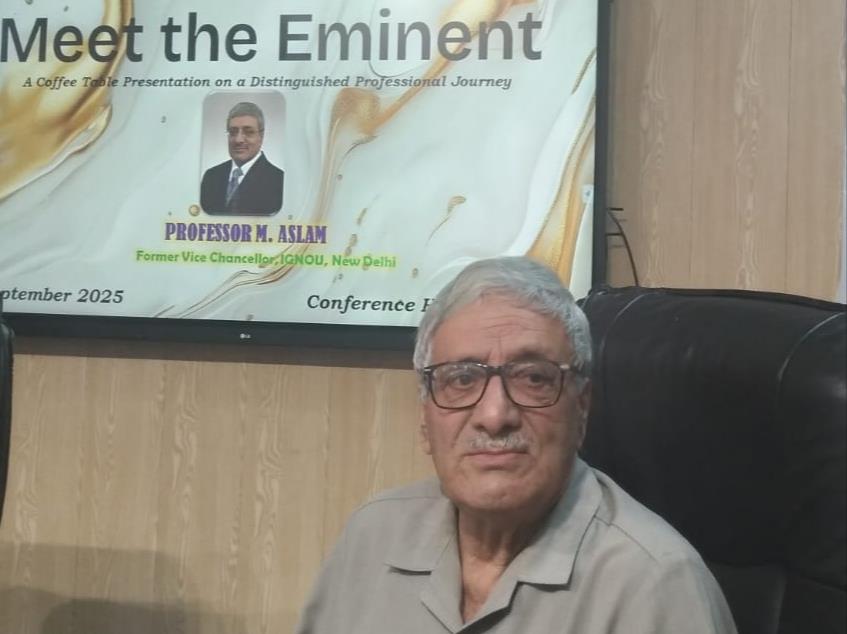A Life In Learning: Prof. Aslam's Kashmir Legacy
Prof. M Aslam
The screen flickered to life. A photograph appeared: an old black-and-white image of a man whose eyes seemed to hold generations of wisdom.“This is Sayyid Meerak Shah Kashani,” Prof. M. Aslam began, his voice soft, reverent.“I would call him my grandfather, my spiritual guide, my first teacher.”
In that old photograph, a young boy stands next to Fakeer-e-Millat, Kashmir's cherished mystic.“That boy,” the professor added,“is me.”
In that moment, the modest conference hall at the University of Kashmir erupted in applause as the audience gathered to turn the pages of the professor's life.
Students, faculty, friends and scholars watched with reverence and wonder as Prof. Aslam recounted the story of his spiritual guide, a man who had lived through the upheaval of colonial India and regarded learning as a light that could illuminate life's darkest corners.
“He used to say,” Prof. Aslam continued,“knowledge is not just for the mind, but for the heart. It is the seed we carry, even when all else seems lost.”
That image of Meerak Shah Kashani marked the start of a journey that would span nearly fifty years, a journey of dismantling barriers in India's education system.
Prof. Aslam's life was a slow, purposeful unfolding of belief, that learning must touch every life, no matter how remote.
As former Vice Chancellor of IGNOU, India's largest open university, he reflected on an extraordinary chapter. In 2014 alone, IGNOU enrolled over 722,000 students.
Behind each number was a story: farmers in Punjab studying after long days in the fields, women in Rajasthan grasping textbooks while raising children, and young Kashmiris learning through intermittent internet in villages cut off by turmoil.
“We don't teach degrees,” Prof. Aslam said.“We teach hope.”
His words hung in the air as he described the Herculean effort to clear a backlog of 3.5 million study materials in just three months. Each package delivered was a silent victory against neglect, each study guide a lifeline extended across the country's vast, uneven terrain.
But perhaps the most profound part of his work lay in the prisons of India.
From 2012 to 2014, study centers inside jails grew from 60 to 94. Beyond statistics, the captives were souls once deemed lost, now given a second chance.
“Every inmate who holds a textbook,” Prof. Aslam said,“is someone society forgot, but who chose not to forget themselves.”
The message resonated deeply in Kashmir, where geography and politics frequently close doors.
The students in the room carried their own burdens, with families uprooted by conflict, schooling interrupted, and dreams delayed by unrest. For them, distance education is a lifeline, not a convenience.

Legal Disclaimer:
MENAFN provides the
information “as is” without warranty of any kind. We do not accept
any responsibility or liability for the accuracy, content, images,
videos, licenses, completeness, legality, or reliability of the information
contained in this article. If you have any complaints or copyright
issues related to this article, kindly contact the provider above.
Most popular stories
Market Research

- NOVA Collective Invest Showcases Intelligent Trading System7.0 Iterations Led By Brady Rodriguez
- 1Inch Unlocks Access To Tokenized Rwas Via Swap API
- Ethereum-Based Meme Project Pepeto ($PEPETO) Surges Past $6.5M In Presale
- USDT0 And Xaut0 Are Now Live On Polygon
- Falcon Finance Announced $FF And Community Sale On Buidlpad
- Japan Halal Food Market Size To Surpass USD 323.6 Billion By 2033 With A CAGR Of 8.1%






















Comments
No comment